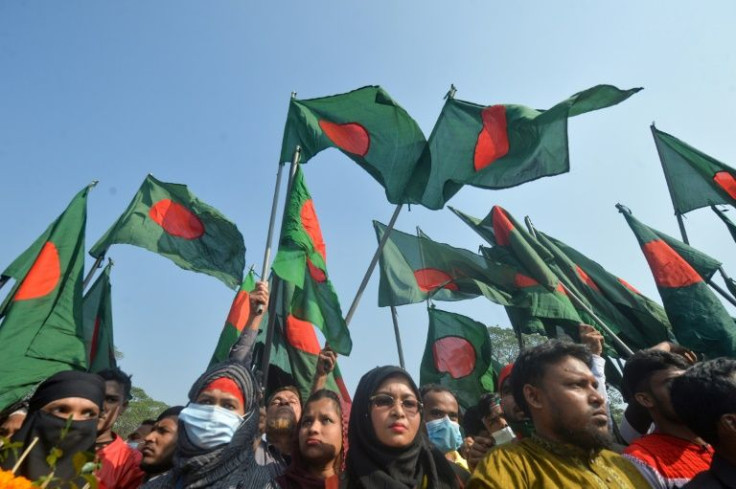Why There Is ‘Not One Beggar In All Of Dhaka’

The economic turnaround in Bangladesh is there for all to see. It is no more what former U.S. Secretary of State Henry Kissinger called a "bottomless basket."
Bangladesh has become the second most favored destination for FDI in the subcontinent by attracting $2.9 billion last year, registering 13 percent growth year-on-year.
The target is to bring the FDI amount to 3 percent of our GDP by 2025, which now stands at 1 percent, according to Bangladesh Investment Development Authority (BIDA), the investment promotion body.
Dhaka very well knows how to negotiate its ways with Washington, Beijing, Moscow, and New Delhi and does not get dragged into power competition as the conflict in Ukraine and the Prophet row in India have shown.
Religious, ethnic, and linguistic ties bind the South Asian nation with India to a greater extent. Though they often lead to contentious issues, Bangladesh has allowed India to build bridges and roads, and India's omnipresence cannot be ignored in the country.
Recently, the ruling Awami League, headed by Prime Minister Sheikh Hasina, refused to criticize India's popular Prime Minister Narendra Modi and his government on the Prophet controversy.
"Hasina, one of the politically astute leaders in South Asia, knows well that there is no alternative to Modi and his rightwing Hindu nationalist party in India.
When influential India's Home Minister Amit Shah undiplomatically called Bangladeshi infiltrators termites, a few years back, Bangladesh simply ignored the slur and swallowed the bitter pill.
Apparently, mindful of India's security, the Hasina government, which is expected to face the polls next year, nixed a proposal for a high-speed railway line, connecting the capital Dhaka with the second largest city Chittagong, despite China aggressively pursuing it.
Of late, Bangladesh has emerged as one of India's major trading partners with bilateral trade crossing the $10-billion mark. Currently, India's investment stands at $3.11 billion, which is expected to touch $9 billion in the near future, said Nurul Majid Mahmud Humayun, Bangladesh Industries Minister, at the beginning of this year.
China has been an economically attractive partner for Bangladesh when it comes to developmental assistance and investments in multiple sectors, including transport and technology.
On 25 June, the country will inaugurate the $3.6 billion Padma Bridge, the longest bridge anywhere on the River Gangas, which a Chinese company constructed after the World Bank abandoned it in 2012.
The 6-km bridge on the choppy waters of the Padma River will provide a major fillip to trade in the southwest region of the country.
No wonder it is called the "bridge of pride" in the country.
On 14 June, the BIDA inked a memorandum of understanding with the Bangladesh China Chamber of Commerce and Industry to increase Chinese investment in Bangladesh.
Despite China's economic clout, when Beijing told Bangladesh to stay independent and not to join the Quad alliance comprising India, the U.S., Japan and Australia in May this year, Bangladesh Foreign Minister AK Abdul Momen said, "We are an independent and sovereign state. We decide our foreign policy."
The U.S. is, directly and indirectly, wooing Bangladesh to pick sides in the ongoing geopolitical tension with China in the Indo-Pacific, but the Muslim majority country of 165 million has kept its cards close to its chest so far while keeping Washington guessing.
This year marks the 50th anniversary of ties between the two nations, which paved the way for the April meeting between U.S. Secretary of State Antony Blinken and A.K. Abdul Momen.
Bangladesh abstained at the United Nations General Assembly vote, which condemned Russia's invasion of Ukraine. While staying away in March, the country philosophically said: "Friends to all, malice to none."
When it comes to Russia, the popular narrative and historical memory still hold sway in Bangladesh which Prime Minister Hasina notably pushed when she said that, given how "Russia had helped Bangladesh against the United States" in 1971, it merits reciprocation when the country is alienated on the world fora.
In 1971, the Soviet Union along with India supported Bangladesh's Liberation War which it won against the strategic alliance of Pakistan and the U.S.
Playing safe has helped Bangladesh to perform well on the economic front. In a remarkable achievement, the country's per capita GDP overtook India in 2020, whose economy is ten times bigger and its 1.3 billion population six times larger.
Compared with Pakistan, from which it broke away in 1971, Bangladesh's per capita is 37 percent higher.
"There is not one beggar in all of Dhaka," information minister Hasan Mahmud recently told visiting foreign journalists.





